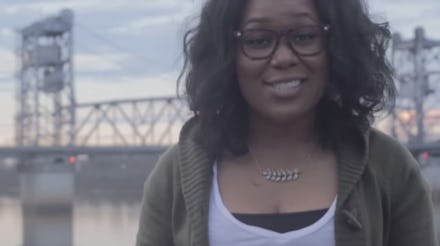This Poet Has the Perfect Response for People Who Make Fun of "Ghetto" Names

Shaniqua. Tamika. Latesha.
Those names, among many others, often get jeered as "black" or "ghetto," and the people who bear them often encounter challenges based on these stereotypes. It's a struggle New Orleans-based spoken word performer Sha'Condria Sibley perfectly sums up in her powerful spoken word poem "To All the Little Black Girls With Big Names." In the poem, Sibley both celebrates her unique name while decrying the unfair stigma that surrounds it.
"This here poem is for every daughter who ever became a professional, only to shorten her name to a letter and a period just so phone calls could be returned or higher pay earned — 'cause we all know, don't nobody want an -esha or an -iqua to operate on them," she says.
"But, you see, a book can't be judged by its cover nor its title, and the story beneath your name can't be contained beneath the tide."
What's in a name? Quite a lot. So-called "ghetto" names also exist for black men, but more often than not in mainstream culture the names of black women are a punchline. As Mic's Marcie Bianco noted in February, from "discrimination in the classroom to job discrimination and housing discrimination, people with stigmatized names face damaging psychological and socioeconomic consequences." Indeed, as Bianco writes, some will even shorten or alter their names as a way of hiding their identity, a phenomenon New York University law professor Kenji Yoshino calls "covering." It's an intentional act of survival and protection from discrimination, even the annoyance of having one's name constantly mispronounced, to which Sibley attests.
"I remember there once was a day when I wished my mother would've stuck to something 'simple' and 'pretty' and 'majestic' like Tiffany or maybe even Alexis," she says in the video. "But my fate was sealed by signatures on my birth certificate."
These names have more meaning than you think. Many so-called "ghetto" names have historical roots. Over at BuzzFeed, Sheridan Watson compiled a list of 20 names that have long been stigmatized for black people, along with the roots and meanings behind each one. The name Aisha, for example, has roots in Swahili and Arabic and can mean "living and prosperous."
In other cases, black baby names are born of creativity or used to resist English names imposed during slavery. As Searching for Shaniqua filmmaker Phill Branch told Mic in February, "At one time, naming children something other than Phill, James, Kim, etc., was an act of resistance for many black parents. They were asserting their agency." It's the very agency, as Sibley contends, that often gets ignored when people talk about "ghetto" names.
"They chalk it up to literacy, never even creativity or maybe even history. And, I wonder, if those who assume would ever stop to wonder if, maybe, transatlantic submerged native tongues have reemerged in the form of 'ghetto' monickers," Sibley says. "Like, my little cousin, whose name is Tanisha, sounds like Tinashe, a name from the Shona tribe meaning 'God is with us.'"
Respect matters. Having a name that isn't John, Emily or Mary doesn't mean an individual deserves disrespect or ridicule. Even if someone's name isn't of the mainstream English variety, that's no excuse for avoiding a sincere effort to honor the name with correct pronunciation.
Sibley's solution to the issue? She says women like her should let their names "rise" and "take their rightful places" in all areas of their personal and professional lives.
"And if someone happens to mispronounce your name, make sure you give the neck a swirl, look them dead in the eye and correct them," she says. "It's pronounced Shuh-cahn-dree-uh. Say it right, or don't say it at all."
h/t For Harriet